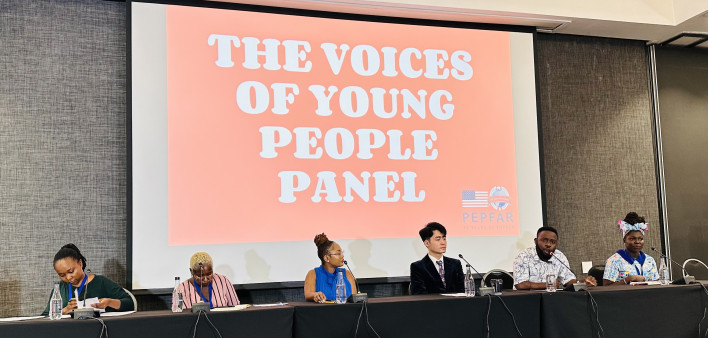It is that time of the year when civil society organizations (CSOs), governments, the United States government’s President’s Emergency Plan for AIDS Relief (PEPFAR), and other partners convene in Johannesburg, South Africa, to plan for funding for the year 2023 and beyond. PEPFAR is the largest donor to over 50 countries in the global HIV response. This was the first in-person meeting since the pronunciation of COVID-19 as a global pandemic.
In comparison to the previous PEPFAR Country/Regional Operating Plan process (COP), there have been many differences. This year’s co-planning emphasized co-planning with in-country leadership, a short time frame, and a focus on the five pillars of the PEPFAR new strategy, which are health equity for priority populations, sustaining the response, public health systems and security, transformative partnerships; and follow the science.
As part of the global CSOs supporting country partners, Prevention Access Campaign (PAC), the organization that launched the Undetectable = Untransmittable (U=U) movement, joined other global CSOs worldwide and provided technical support to Burundi, Malawi, Tanzania, and South Africa. PAC identified these countries as its priority as part of week one of the co-planning meetings. Next week, PAC will prioritize Nigeria, Uganda, Zambia, Zimbabwe, and West and Central Africa as part of week two.
Human Rights For All is Everyone’s Agenda
In February of 2021, US President Biden issued a presidential memorandum to expand the protection of the rights of lesbian, gay, bisexual, transgender, queer, and intersex (LGBTQI) people worldwide. In his speech, the President said, “We’ll ensure diplomacy and foreign assistance are working to promote the rights of those individuals, including by combating criminalization and protecting LGBTQ refugees and asylum-seekers.”
We continue to call for PEPFAR leadership to follow the direction of the US President, asking for all US diplomats to promote the universal human rights agenda that should and has been the core of PEPFAR.
During this week’s PEPFAR COP meetings, we witnessed increased targeted attacks on LGBTQI people across Uganda, Kenya, and Tanzania. Inequalities like these will prevent us from eradicating AIDS, with draconian laws preventing healthcare access. The activists and comrades attending the COP meetings have had to respond and demand answers from PEPFAR, who hasn’t responded to these issues in the strongest way possible.
We continue to call for PEPFAR leadership to follow the direction of the US President, asking for all US diplomats to promote the universal human rights agenda that should and has been the core of PEPFAR.
As PAC, we stand in solidarity with African gay and bisexual men and other men who have sex with men; transgender and nonbinary people; sex workers of all sexual orientations, gender identities, and expressions; and people who use and inject drugs. Lesbian, bisexual, and queer women and intersex people are excluded from targeted HIV prevention and treatment.
PEPFAR COP23 with drastic changes: Lack of adequate CSO engagement
This year’s CSO engagement at the COP was insufficient to a significant degree, as we observed. The absence of program data, especially quarter one data, and the inability to review data made it extremely difficult for CSO representatives to engage meaningfully in country rooms.
Before the Johannesburg meeting, the PEPFAR Ambassador had made it known that no decisions would be made at this meeting and that they were taking money off the table to enable a substantial conversation. But that was the opposite as activists experienced from week one of COP engagement. In previous years conversations in the room were based on program data and evidence from the country. Additionally, the CSO priority was not the main component of the discussion, as no decisions were made on any of the priorities that CSOs presented despite being indicated in the collaboration model. Some countries held presentations without the opportunity for CSOs to ask questions or clarify, particularly to government representatives. Although as the week went by, CSOs were able to push for additional time to present their “People’s COPs" and other priorities, questions remain if they can follow up on these priorities in a safe environment when they are back in the country.
PEPFAR has promised to prioritize the voices of civil society organiztions throughout the PEPFAR COP process in-country until the final country document is validated. We will all need to hold them accountable.
To ensure that the voices of country representatives are prioritized, PAC, Health Gap, and other global and country CSOs held daily check-in meetings. CSOs raised a loud cry during these meetings regarding the prioritization of their voices, especially in the presence of government officials. PEPFAR has promised to prioritize the voices of CSOs throughout the PEPFAR COP process in-country until the final country document is validated. We will all need to hold them accountable.
Supporting country partners to engage in PEPFAR COP23
Through our broader support, our team identified priority countries and provided technical assistance for partners to participate in the PEPFAR COP process, reviewed country-specific plans, made recommendations, and worked with partners to develop U=U-specific checklists. The focus looked at ensuring that there is the prioritization of U=U at PEPFAR COP/ROP2323.
Prioritization of U=U at PEPFAR COP23

U=U in COP rooms: Burundi | Malawi | South Africa | Tanzania
An advocate’s guide for prioritizing U=U in PEPFAR COP/ROP23 was developed and disseminated to support advocates in pushing for the prioritization of U=U in 2023 and beyond.
It is paramount to note that the four countries we have been supporting have prioritized U=U in their planning during the in-person co-planning meeting in Johannesburg, South Africa.
As part of a strategic initiative to control the HIV epidemic throughout the cascade, CSOs in Burundi and World Health Organization highlighted the urgent need to build capacity among community actors, people living with HIV, key populations, and healthcare providers through scientific developments: U=U literacy.
UNAIDS’s Country Office in South Africa will continue to support national treatment literacy guidelines and launch U=U campaigns. In addition, during week one’s country outbrief, the South Africa government Deputy Director General stated that South Africa will “re-energize commitment across all sectors toward 95-95-95 through the U=U campaign launch."
Malawi’s government representative emphasized the significance of the U=U (T=T) strategy campaign and that the CSOs will take the lead in implementing it beginning in 2023.
As a result of the government of Tanzania’s efforts, information, education, and communication materials on U=U have been drafted, and the Ministry plans to distribute the materials to other regions of the country. There is also an ongoing plan to co-launch a National U=U campaign in Tanzania with the Government, CSO and PEPFAR.
Prioritizing the voices of young people in all their diversity

Tinashe Rufurwadzo (Zimbabwe) and PEPFAR Ambassador Nkengasong at town hall session
Among adolescents and young people, HIV transmission rates are a major concern based on PEPFAR data. The PAC and youth representatives from week one countries addressed Ambassador Nkengasong in a town hall session on the 95-95-95 targets and their priorities.
We celebrate that this collaborative advocacy resulted in Ambassador Nkengasong’s committment to establish the first PEPFAR Youth Advisory Panel that will bring ongoing global support to youth-specific issues.
There is a need for young people to be considered as service providers across the 95-95-95 targets, enabling them to encourage their peers to get tested for HIV, get on and adhere to treatment, and have an undetectable viral load. U=U education leads to higher adherence rates, viral load testing, and viral suppression, and young people are a powerful resource for education.
PAC and Global Network of Young People Living with HIV (Y+ Global) organized with PEPFAR a last-minute interactive youth plenary session as part of the closing session. Many thanks to the PEPFAR team for recognizing the gap in young voices at the COP and heeding the call for such a session.
This was the first session where young people living with HIV, adolescent girls, young women, and young key populations provided solutions on youth participation in 95-95-95, sustainability, and what young people need from a youth movement.
We celebrate that this collaborative advocacy resulted in Ambassador Nkengasong’s commitment to establish the first PEPFAR Youth Advisory Panel that will bring ongoing global support to youth-specific issues.
Commitment from PEPFAR moving forward:
- CSOs will be involved in all external meetings in-country throughout the remaining seven weeks to COP23 approval.
- PEPFAR Coordinator will continue to include CSO representatives from Johannesburg co-planning delegation to each meeting with stakeholders.
- The PEPFAR Coordinator team will meet weekly with the week 1 CSO representatives to share progress, targets, and budget development.
- Required virtual check-in with CSO with SGAC before midpoint to check in with SGAC to review concerns, questions, and asks about tools.
- PEPFAR Country Teams will ensure a safe physical space for CSO representatives to meet throughout the PEPFAR process e.g., the CSO situation room.
- All presentations will have CSO-responsive slides to acknowledge any concerns and how they are addressed in the presentation and review data provided by CSO to support responses.
Activists coming for week two should know the following:
- Request for the week’s agenda ahead of time.
- Ask for quarter one data and conversation tracking tool.
- Make sure to have your printed copies of people’s COP to hand out.
- Secure a town hall session with the SGAC at the beginning of the week.
- Be present and participate during the CSO daily briefing meetings.
Stay tuned for week two, where we will provide updates from Nigeria, Uganda, Zambia, Zimbabwe, and West and Central Africa rooms.
Do you want to learn more about the issues above and engage with PEPFAR – from Johannesburg or afar? Check out these resources:
- PAC’s Advocate’s Guide for Prioritizing U=U in PEPFAR COP/ROP23.
- Health GAP’s PEPFAR Watch
- amfAR has created user-friendly databases to understand what’s happening with PEPFAR programming at the country level. Check out their database on performance (amfar.org). You can download country fact sheets in English, French, and Portuguese.
Those who were here this week, kindly complete the CSO delegates survey here: bit.ly/COP23Survey
As for week two, we will support country CSO representatives and continue to provide technical support to PAC’s priority countries.
For all inquiries and support requests, please contact PAC at info@preventionaccess.org
Prevention Access Campaign united global activists, researchers, and health officials to launch the U=U campaign in 2016 to create and communicate a consensus about the largely unknown fact: people living with HIV who are on treatment and have an undetectable viral load cannot sexually transmit HIV (Undetectable=Untransmittable, or U=U). Today, the U=U campaign is a thriving and growing community-led movement of HIV advocates, activists, researchers, and over 1,050 Community Partners from 105 countries, uniting to make U=U a reality for all people living with HIV. Together, we are changing what it means to live and love with HIV around the world.
Join us!
Twitter | Facebook | Instagram | Youtube
#UequalsU #WinWinAgenda








Comments
Comments